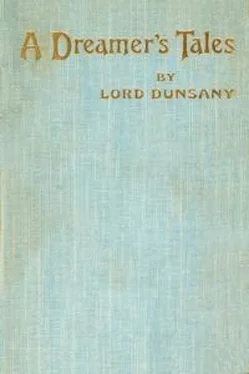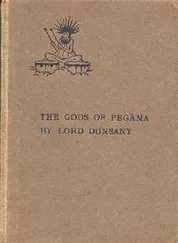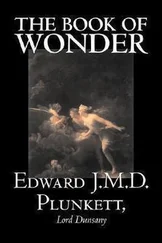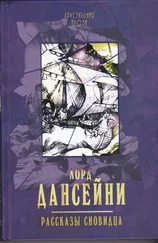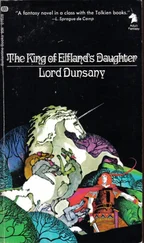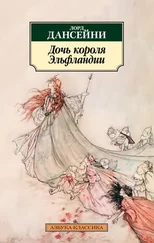Then they all drew their swords, and waved them high in the firelight, and declared war on Fate.
Nothing in the sombre forest stirred or made any sound.
Tired men do not dream of war. When morning came over the gleaming fields a company that had set out from Arn discovered the camping–place of the warriors, and brought pavilions and provender. And the warriors feasted, and the birds in the forest sang, and the inspiration of Arleon awoke.
Then they arose, and following Arleon, entered the forest, and marched away to the South. And many a woman of Arn sent her thoughts with them as they played alone some old monotonous tune, but their own thoughts were far before them, skimming over the bath through whose deeps the river tumbles in marble Carcassonne.
When butterflies were dancing on the air, and the sun neared the zenith, pavilions were pitched, and all the warriors rested; and then they feasted again, and then played knightly games, and late in the afternoon marched on once more, singing of Carcassonne.
And night came down with its mystery on the forest, and gave their demoniac look again to the trees, and rolled up out of misty hollows a huge and yellow moon.
And the men of Arn lit fires, and sudden shadows arose and leaped fantastically away. And the night–wind blew, arising like a ghost, and passed between the tree–trunks, and slipped down shimmering glades, and waked the prowling beasts still dreaming of day, and drifted nocturnal birds afield to menace timorous things, and beat the roses against cottagers’ panes, and whispered news of the befriending night, and wafted to the ears of wandering men the sound of a maiden’s song, and gave a glamour to the lutanist’s tune played in his loneliness on distant hills; and the deep eyes of moths glowed like a galleon’s lamps, and they spread their wings and sailed their familiar sea. Upon this night–wind also the dreams of Camorak’s men floated to Carcassonne.
All the next morning they marched, and all the evening, and knew they were nearing now the deeps of the forest. And the citizens of Arn kept close together and close behind the warriors. For the deeps of the forest were all unknown to travellers, but not unknown to those tales of fear that men tell at evening to their friends, in the comfort and the safety of their hearths. Then night appeared, and an enormous moon. And the men of Camorak slept. Sometimes they woke, and went to sleep again; and those that stayed awake for long and listened heard heavy two–footed creatures pad through the night on paws.
As soon as it was light the unarmed men of Arn began to slip away, and went back by bands through the forest. When darkness came they did not stop to sleep, but continued their flight straight on until they came to Arn, and added there by the tales they told to the terror of the forest.
But the warriors feasted, and afterwards Arleon rose, and played his harp, and led them on again; and a few faithful servants stayed with them still. And they marched all day through a gloom that was as old as night, but Arleon’s inspiration burned in his mind like a star. And he led them till the birds began to drop into the tree–tops, and it was evening and they all encamped. They had only one pavilion left to them now, and near it they lit a fire, and Camorak posted a sentry with drawn sword just beyond the glow of the firelight. Some of the warriors slept in the pavilion and others round about it.
When dawn came something terrible had killed and eaten the sentry. But the splendour of the rumours of Carcassonne and Fate’s decree that they should never come there, and the inspiration of Arleon and his harp, all urged the warriors on; and they marched deeper and deeper all day into the forest.
Once they saw a dragon that had caught a bear and was playing with it, letting it run a little way and overtaking it with a paw.
They came at last to a clear space in the forest just before nightfall. An odour of flowers arose from it like a mist, and every drop of dew interpreted heaven unto itself.
It was the hour when twilight kisses Earth.
It was the hour when a meaning comes into senseless things, and trees out–majesty the pomp of monarchs, and the timid creatures steal abroad to feed, and as yet the beasts of prey harmlessly dream, and Earth utters a sigh, and it is night.
In the midst of the wide clearing Camorak’s warriors camped, and rejoiced to see the stars again appearing one by one.
That night they ate the last of their provisions, and slept unmolested by the prowling things that haunt the gloom of the forest.
On the next day some of the warriors hunted stags, and others lay in rushes by a neighboring lake and shot arrows at water–fowl. One stag was killed, and some geese, and several teal.
Here the adventurers stayed, breathing the pure wild air that cities know not; by day they hunted, and lit fires by night, and sang and feasted, and forgot Carcassonne. The terrible denizens of the gloom never molested them, venison was plentiful, and all manner of water–fowl: they loved the chase by day, and by night their favourite songs. Thus day after day went by, thus week after week. Time flung over this encampment a handful of noons, the gold and silver moons that waste the year away; Autumn and Winter passed, and Spring appeared; and still the warriors hunted and feasted there.
One night of the springtide they were feasting about a fire and telling tales of the chase, and the soft moths came out of the dark and flaunted their colours in the firelight, and went out grey into the dark again; and the night wind was cool upon the warriors’ necks, and the camp–fire was warm in their faces, and a silence had settled among them after some song, and Arleon all at once rose suddenly up, remembering Carcassonne. And his hand swept over the strings of his harp, awaking the deeper chords, like the sound of a nimble people dancing their steps on bronze, and the music rolled away into the night’s own silence, and the voice of Arleon rose:
“When there is blood in the bath she knows there is war in the mountains, and longs for the battle–shout of kingly men.”
And suddenly all shouted, “Carcassonne!” And at that word their idleness was gone as a dream is gone from a dreamer waked with a shout. And soon the great march began that faltered no more nor wavered. Unchecked by battles, undaunted in lonesome spaces, ever unwearied by the vulturous years, the warriors of Camorak held on; and Arleon’s inspiration led them still. They cleft with the music of Arleon’s harp the gloom of ancient silences; they went singing into battles with terrible wild men, and came out singing, but with fewer voices; they came to villages in valleys full of the music of bells, or saw the lights at dusk of cottages sheltering others.
They became a proverb for wandering, and a legend arose of strange, disconsolate men. Folks spoke of them at nightfall when the fire was warm and rain slipped down the eaves; and when the wind was high small children feared the Men Who Would Not Rest were going clattering past. Strange tales were told of men in old grey armour moving at twilight along the tops of the hills and never asking shelter; and mothers told their boys who grew impatient of home that the grey wanderers were once so impatient and were now hopeless of rest, and were driven along with the rain whenever the wind was angry.
But the wanderers were cheered in their wandering by the hope of coming to Carcassonne, and later on by anger against Fate, and at last they marched on still because it seemed better to march on than to think.
For many years they had wandered and had fought with many tribes; often they gathered legends in villages and listened to idle singers singing songs; and all the rumours of Carcassonne still came from the South.
Читать дальше
